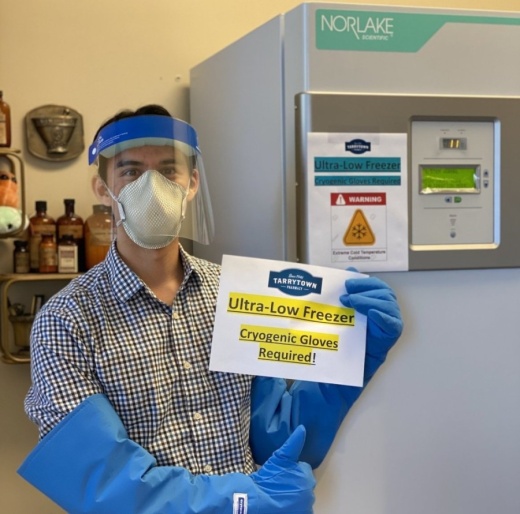“Being a part of independent pharmacy—which is basically just a locally owned independent pharmacy not owned by a corporation—we just care a lot about our community,” Ching told Community Impact Newspaper. “A lot of the people that are overlooked are the small guys like us, like our community, our patients.”
Even before vaccine manufacturers Pfizer and Moderna announced the high efficacy of their vaccines and saw them approved for emergency use authorization by the Food and Drug Administration, Tarrytown Pharmacy was eyeing the companies’ research. When the time came, Ching wanted his pharmacy to be among the first providers of the vaccine in Austin, so he invested in technology that would position Tarrytown Pharmacy to do so: the ultra-low freezer required to store Pfizer’s vaccine.
Knowing that Pfizer’s vaccine, a leading candidate in development at the time, required storage at -94 degrees Fahrenheit, Ching said Tarrytown Pharmacy ordered a $13,000 deep freezer Sept. 24.
“I knew that their storage requirements were stringent, and so most likely hospitals and big health care provider offices would probably have access or be prioritized over a family-owned local business,” Ching said. “Our initial thought process was, if we can target that vaccine that no one can store well or properly, then that might be the best way for us to get the vaccine early.”
Few facilities own the freezer Ching purchased, he said, because previously it was primarily only specialized research laboratories that had use for them. Ching counted on being one of the few facilities in Austin that would have the capability to store Pfiizer’s doses at appropriate temperatures, in addition to places like UT Health Austin and Dell Medical School, which have said they will utilize ultra-low freezers already belonging to the University of Texas.
Once the state opened applications for facilities hoping to be official vaccine distributors, Tarrytown Pharmacy applied, and did its best to alert DSHS that it had an ultra-low freezer through tweets and messages.
As Ching predicted, only large hospitals and medical facilities were included in the first round of distribution by the Texas Department of State Health Services following the Food and Drug Administration’s emergency use authorization of the Pfizer vaccine Dec. 10. However, DSHS announced the pharmacy as a distributor for the second week of distribution, allocating them 500 doses of the Moderna vaccine. Ching expects to receive the shipment on Dec. 23 or 24.Our ultra-low freezer can store the @pfizer's COVID vaccine! @TexasDSHS, we're ready to serve our community like we have for 79 years #since1941 @GregAbbott_TX @Commpharmacy @pharmacists @UTexasPharmacy @CDCgov @TXpharmAssn @KXAN_News @KUT @NPRHealth @statesman #COVID19 @TXlege pic.twitter.com/4UseP0bGIN
— Tarrytown Pharmacy (@TarrytownRx) December 8, 2020
Moderna’s dose can be stored in a regular freezer, so Tarrytown Pharmacy has not made use of its ultra-low freezer yet, but Ching feels confident it will as Texas receives further allocations of the Pfizer vaccine.
“The Moderna one will be much more sought after, because every hospital, doctor’s office, or pharmacy can store the Moderna vaccine,” Ching said. “Probably only 50 locations in the whole state of Texas can store the Pfizer vaccine [long-term].”
Regardless, Ching said he and his staff plan to think strategically about which areas of the community will need doses most, whether they be formulated by Pfizer or Moderna.
“[Hospital systems] are going to be focusing on immunizing their staff and their staff only. They're not going to go to nursing homes. They're not going to go into businesses,” Ching said. “We need all of our front-line workers immunized, but who's going to stick up for the homebound great-grandmother that can’t go to a pharmacy? We would be there to help them.”
Of the first 500 doses Tarrytown Pharmacy is set to receive, Ching said most will go to the residents and staff of nursing homes, where the pharmacy has already set up plans to bring vaccination clinics. As more shipments arrive and the state’s guidelines for should receive access to vaccines expands, he plans to arrange mobile clinics in key areas of the community.
“The benefit of being a small business is that we are really adaptable. I know for a fact that if I woke up tomorrow and a shipment of 1,000 COVID-19 vaccines showed up at my door, I would be able to give every single one of those doses where it needed to go very quickly,” he said.





